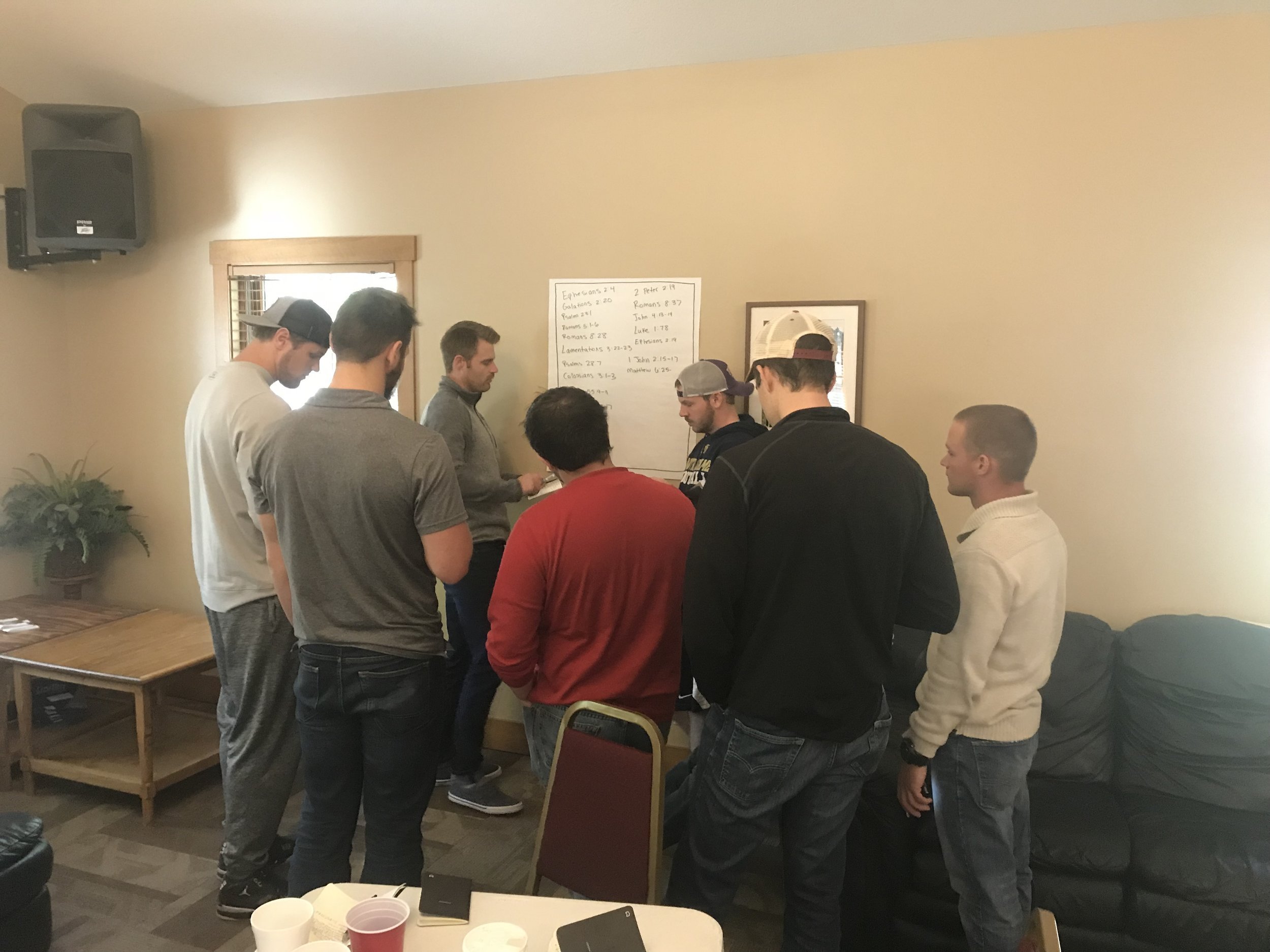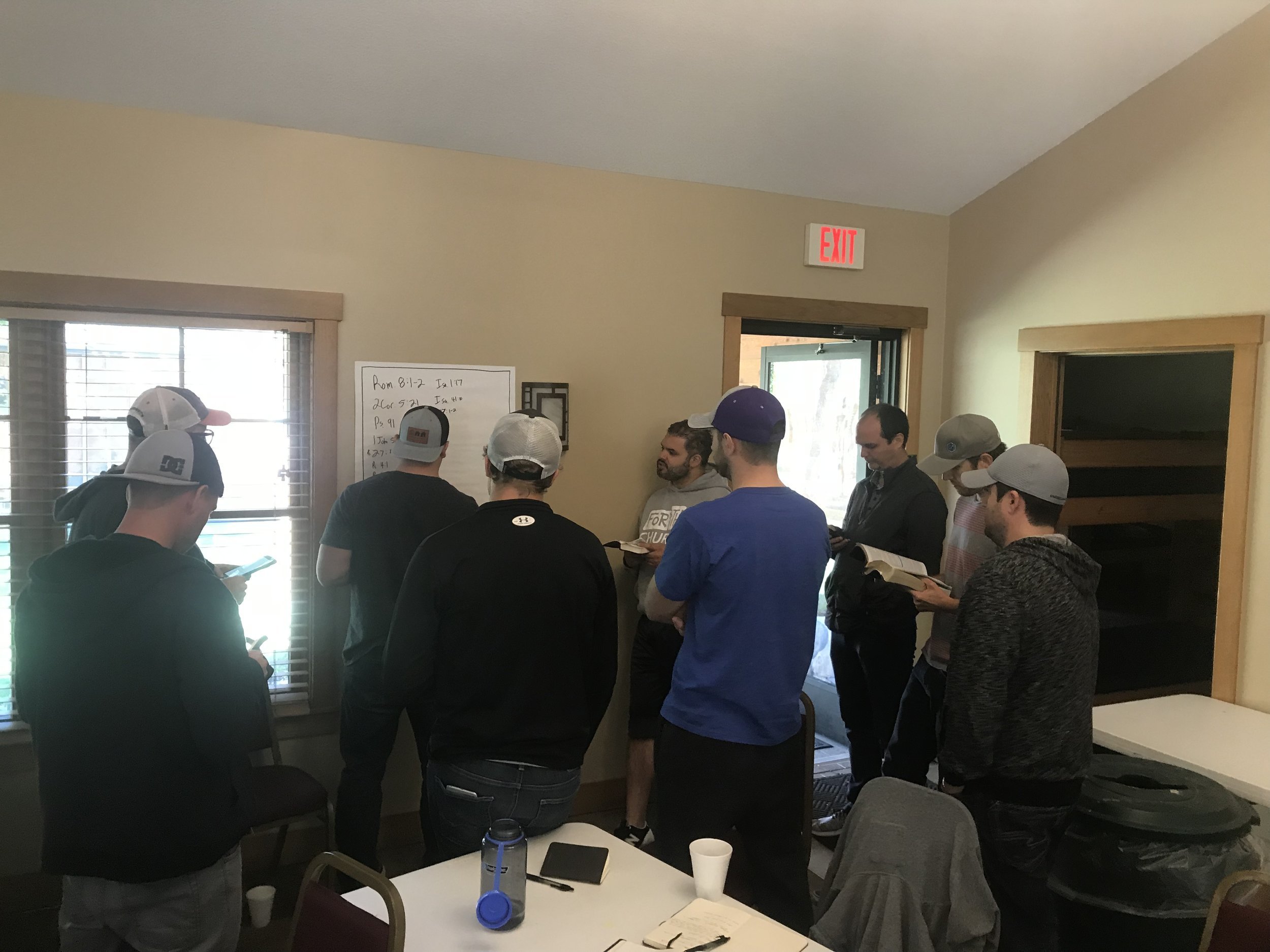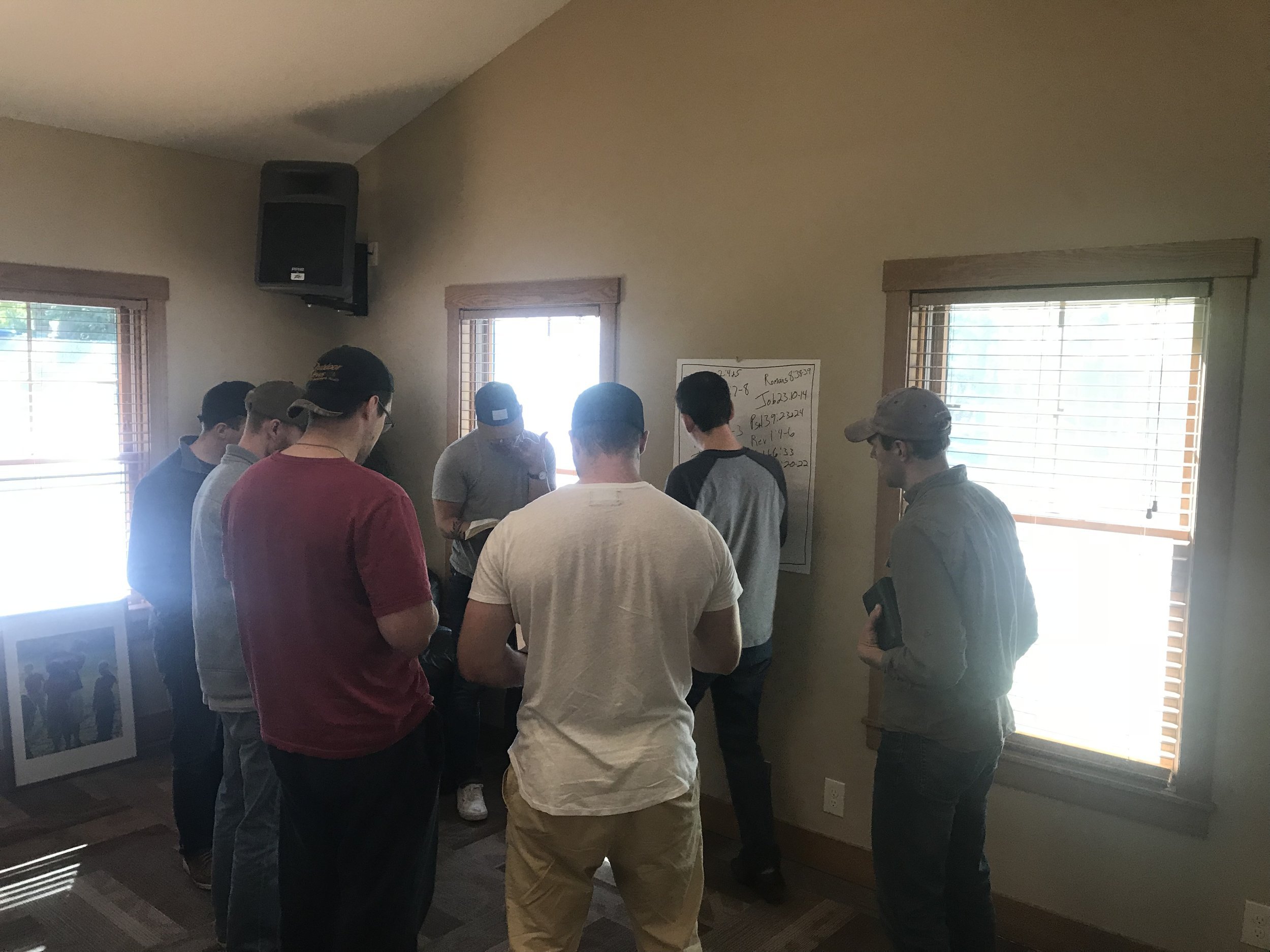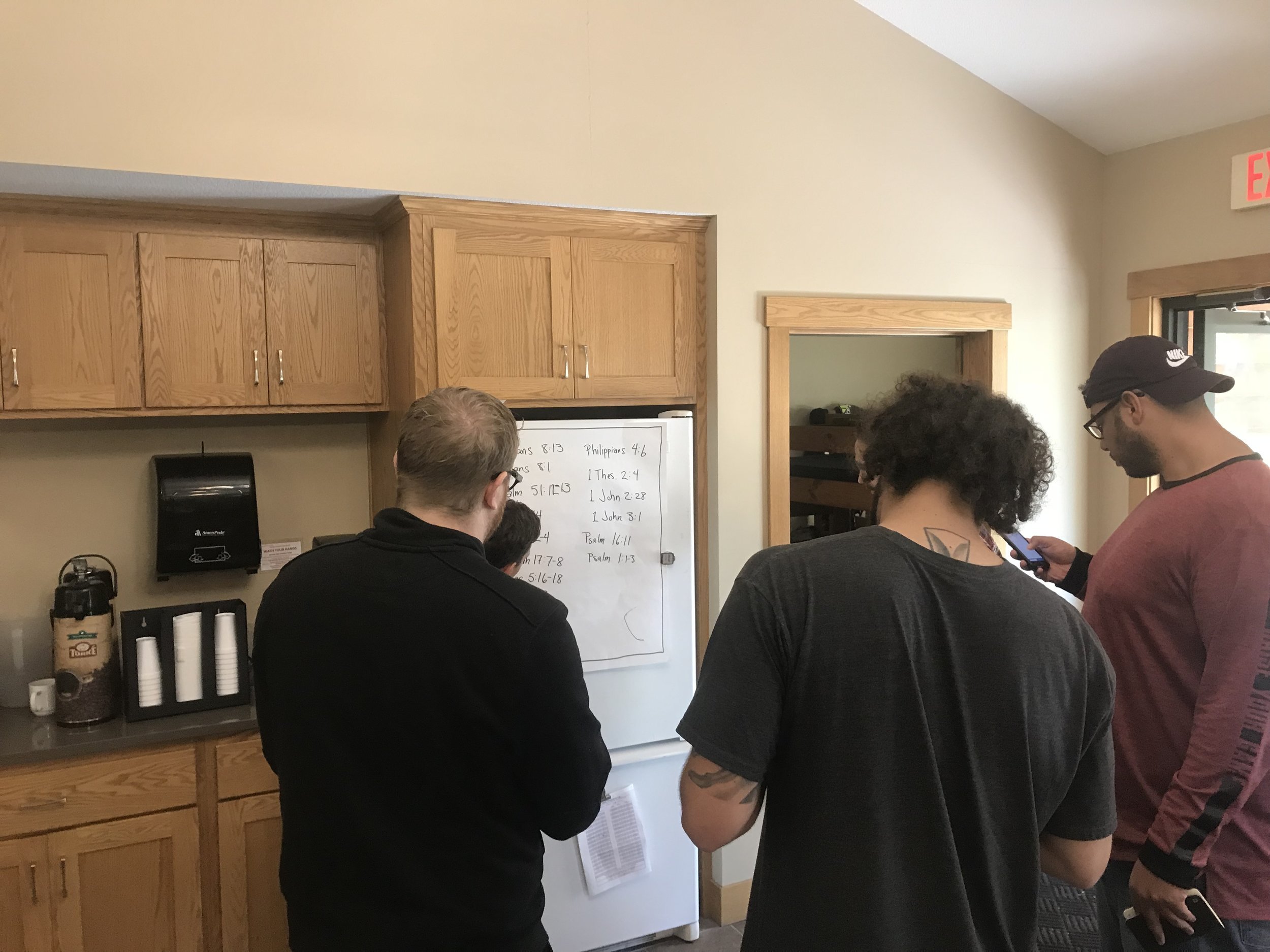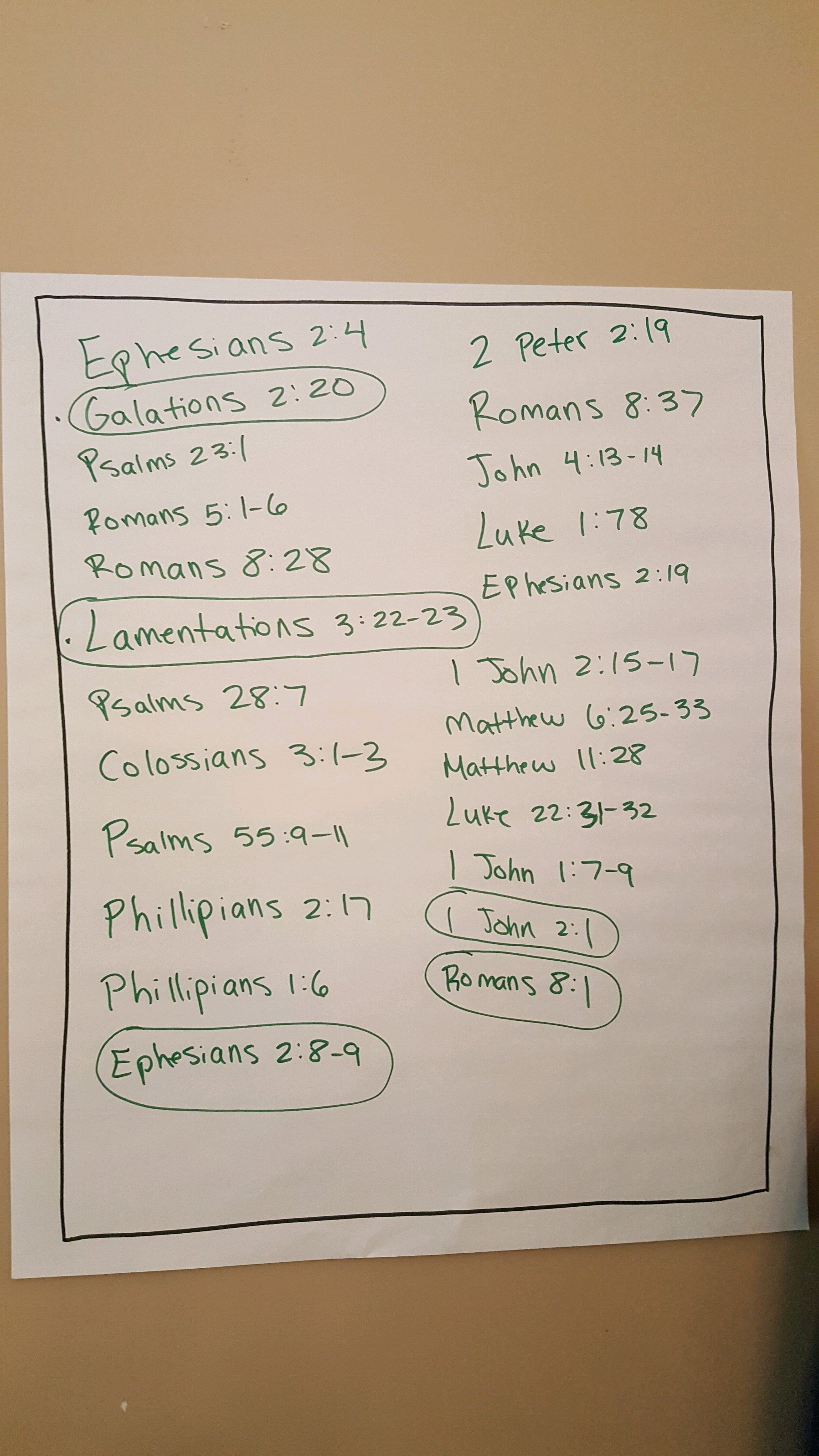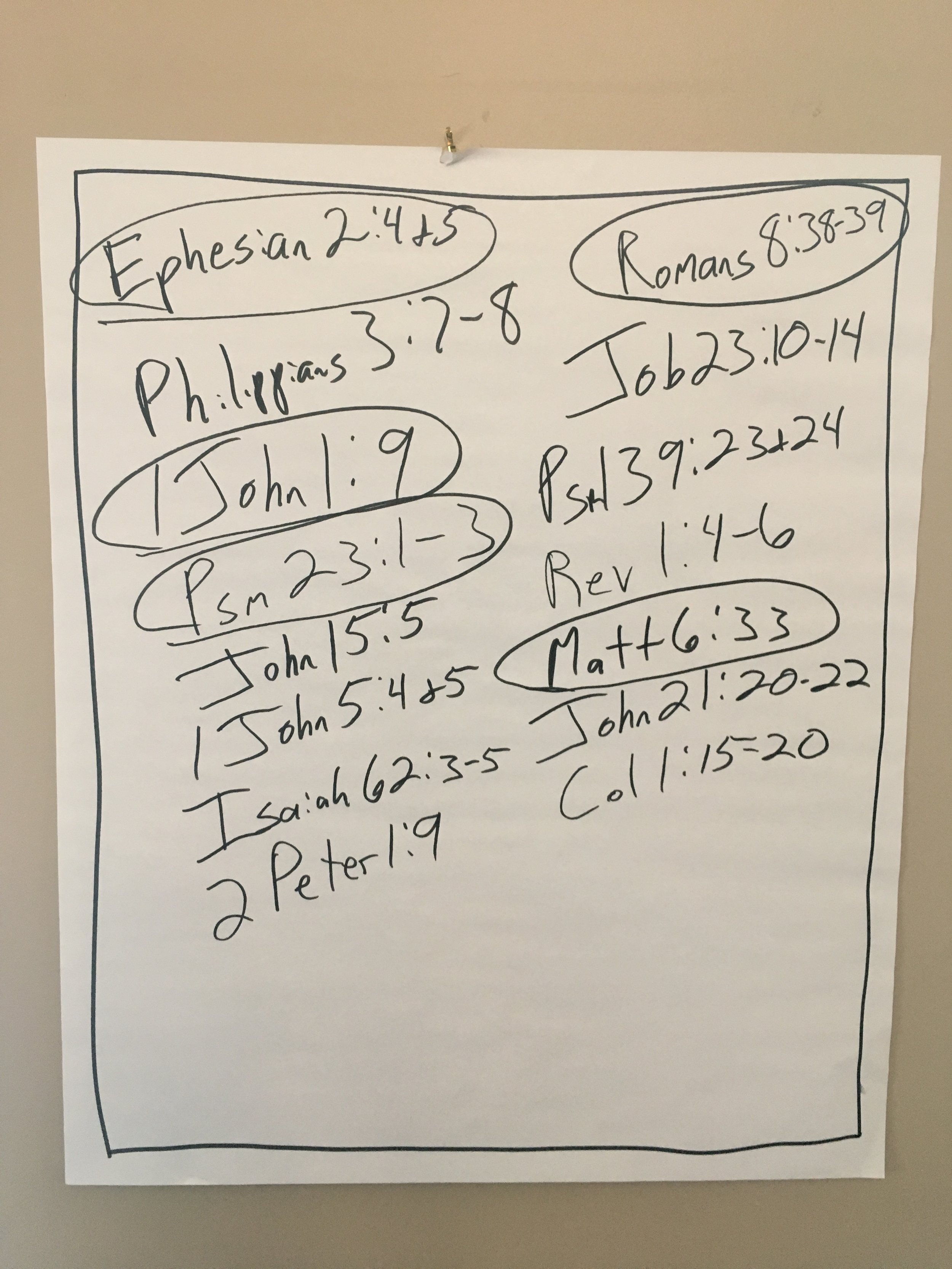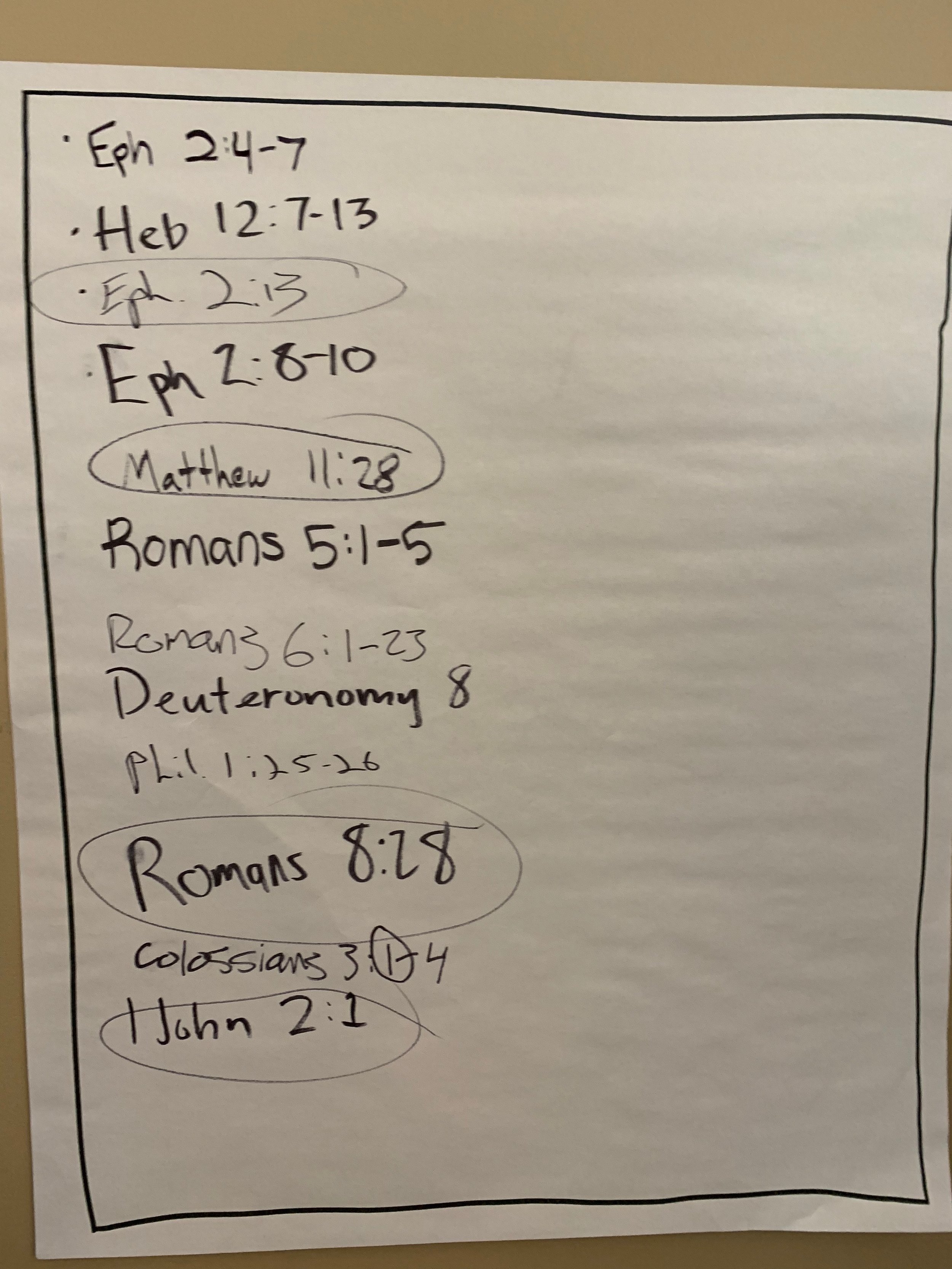The Watchful Man
[The following is the combined manuscript from two sessions delivered at the 2018 Men’s Retreat.]
Introduction
Session 1
For starters tonight, we’re going to look closer at the Bible’s command to be watchful, applied especially for men. Watchfulness is a command for all Christians — men, women, boys, and girls. But I want us to think carefully about what it means to be a “watchful man.”
Session 2
Then tomorrow we’re going get a little more immersive, and we’re going to connect the dots between watchfulness and personal resolve. That’s because I don’t want this to be just information, but I want us each to take something home.
Praying Together
And with that said, we’re now at this important juncture where all the planning and prep has happened, but we’re still not done with the execution — that’s what is happening right now. And so right now is important, and how we think and operate matters. We find ourselves in junctures like this all the time. And one option is to sort of just let it go; we can be fatalistic and say “it is what it is,” and just roll with it.
Or, we can pray. We can ask God, as we have been asking God,
to give growth where we’ve planted and plowed,
to fulfill our every resolve for good and our every work of faith, and
to surprise us with more than what we deserve — which means asking God to give us blessings we are not wise enough or capable of achieving ourselves but which he delights to send anyway.
I want us to pray like that here at the start, and because I think we’re going to be at this juncture throughout the talks tonight and tomorrow, and so I want us to plan to pray together more over the next 18 hours.
So let’s break up into smaller groups. If your Life Group is here, you can connect with those guys, or just jump into any group of 3–4 guys. So go ahead and do that.
And let’s pray about this: I don’t know what kind of expectations you bring to the retreat, but let’s ask the Father to surprise us. Let’s ask him for insight, and for resolve, and that he do a work in our hearts. And get more detailed if you can. Let’s pray that together in our groups.
[Pray for 7–10 minutes; then reconvene.]
Session 1: Watchful for What?
So the theme of this retreat is the The Watchful Man, and before we get into the topic of watchfulness, I want to just say a quick word on the “man” part of this theme. If we’re going to look at what is a “watchful man” then we need to know what a man is. And I mentioned this is the email we sent yesterday, but the best definition of manliness or masculinity that I’ve ever seen goes like this: being a man means gladly assuming sacrificial responsibility.
Being a man means that we take the initiative to lead, provide, and protect at a cost to ourselves for the good of others.
I think that is the calling of every man based upon the sheer fact that they’re a man. That’s what XY means. That’s what God designed men for — and that’s what every man, in one way or another, has fallen short of. Which is why we need a Savior.
Jesus came to this earth and he lived as the one and only perfect man, and when he died on the cross he died for all of our failures as men, so that when we are united to him by faith, our calling as men is redeemed. And I want you to hear that with specificity. It’s not just that you’re a redeemed human. That is true, but it can still sound abstract. It’s still a broader category than the one in which you exist. You are a human, of course — we all are humans — but we’re also men humans. And Jesus died to save us as men sinners. And he was raised from the dead to make us new men. And he has given us his Holy Spirit for that purpose. Jesus has given us supernatural power to make us the kind of men God designed us to be.
And I hope that sounds incredible to you. I know it’s hard for us to believe, but it’s true.
As a redeemed man, as a saved man, as a man who is united to Jesus by faith, the Spirit of Jesus lives inside of you and he gives you the power to gladly assume sacrificial responsibility. It’s not a pipe-dream. It’s not well-wishing. You have the power inside of you to live and love like Jesus. In the Bible we are shown the way, and by the Spirit we are given the power, to be men like Jesus — which is the kind of men God designed us to be.
And watchfulness has everything to do with this.
So now we’re focusing in on watchfulness, and I just want us to hear the way the Bible talks about watchfulness. I want to just read a list of verses that give us the command to be watchful. The Greek word is gregoreo (like the name Gregory), and it’s usually translated in the New Testament as “watch” or “stay awake.” Listen to this list:
Watchfulness (gregoreo)
Matthew, 24:42, “Therefore, stay awake, for you do not know on what day your Lord is coming.”
Matthew 26:41, “Watch and pray, lest you enter into temptation.”
1 Corinthians 16:13, “Be watchful, stand firm in the faith, act like men, be strong.”
Colossians 4:2, “Continue steadfastly in prayer, being watchful in it with thanksgiving.”
1 Peter 5:8, “Be sober-minded; be watchful. Your adversary the devil prowls around like a roaring lion, seeking someone to devour.”
Three More Words
So that’s just the one word, but then there are at least three other Greek words used in the New Testament that have the same meaning. So these are different Greek words, but they’re basically translated the exact same.
Galatians 6:1, “Keep watch (skopeo) on yourself, lest you too be tempted.”
1 Timothy 4:16, “Keep a close watch (epecho) on yourself and on the teaching.”
2 John 8, “Watch (blepo) yourselves, so that you may not lose what we have worked for, but may win a full reward.”
The Same Concept
So those are all translated the exact same way, because they mean the same thing. And then there are different words but the same idea. This is the same concept of watchfulness, which is translated with English words like awakeness or alertness or sober-mindedness. Listen to this list:
Ephesians 5:14, “Awake, O sleeper, and arise from the dead, and Christ will shine on you.”
Romans 13:11, “Besides this you know the time, that the hour has come for you to wake from sleep.”
1 Peter 4:7, “The end of all things is at hand; therefore be self-controlled and sober-minded for the sake of your prayers.”
And then in Ephesians 6:18, “To that end, keep alert with all perseverance, making supplication for all the saints.”
And there are so many other verses I could read, but I think we can all agree that this is important in the Bible!
Over and over again we see this idea of being watchful and awake and alert. We know — according to what the Bible says — we know that God wants us to be watchful. That is clear.
But what is watchfulness for? And how does watchfulness look?
These are the two questions that we’re going to look at tonight, eventually landing in Ephesians 6.
Start with the first question…
What Is Watchfulness For?
So you’ve heard how the Bible uses the command. To be watchful simply means what it says — it means to be careful, to be alert, to pay attention. And the first question is to what? It’s almost like a transitive command. It needs some kind of reference. We’re supposed to be watchful for what? What does all of these commands have in mind? If we’re supposed to be alert and on the lookout, but are we alert and on the lookout for?
Have you guys ever had one of those nights where you can’t fall asleep? Maybe you drank too much coffee, and you’re tossing and turning, and you just can’t sleep? You been there?
This doesn’t happen to me often. I almost have the opposite problem. Sometimes as soon as my head his the pillow, I’m out — and Melissa is in mid-sentence, and she doesn’t appreciate that — so I’m working on it. But there have been a few nights over the last year when maybe because I drank too much coffee, or maybe because I have too much on my mind, I couldn’t sleep. I just kind of laid there. It’s a bad feeling. And what makes that whole experience so frustrating is that you’re awake but you don’t know what you’re awake for. It feels like it’s pointless. And God does not want us to feel that. This command is not meant for us to feel that. So we need to know what are watchful for?
And the good news is that people have thought about this long before us. Going back 500 years ago, this is a theme that Puritans thought and wrote about, and I’ve been helped by them. So I want read to you John Owen’s explanation of watchfulness. And then I’m going to update it a little, and put it our own words. So hear this, from John Owen:
[Watchfulness is] … a universal carefulness and diligence, exercised […] by all ways and means prescribed by God, OVER
our hearts and ways,
the baits and methods of Satan, and
the occasions and advantages of sin in the world,
so that we be not entangled.
Owen says that:
Watchfulness is putting into action all the means and ways prescribed by God to be careful and diligent OVER
our own hearts,
the schemes of Satan, and
the temptations to sin,
so that we be not entangled.
So we’re using all that God gives us to keep an eye on these things that can lead us astray. That is John Owen’s point.
Now I want to build on that and give you an updated definition of watchfulness that’s more positive. Here it is. This is the moment I’ve been waiting for. And I’m excited about this because of the clarity that I’ve found here. But here’s our definition of watchfulness. I’m building off of Owen, but I’m saying it more positive. Here we go:
“Watchfulness means that we lay hold of every resource God has given us so that the reality of God stays clear in our hearts and minds. ”
So what are we watching for? What are we pay attention to?
We are paying attention to confront every falsehood about God with the truth of God.
When We Lack Watchfulness
That’s what watchfulness is. And it might help to think about the opposite of watchfulness. The opposite of watchfulness is the greatest problem we deal with everyday. It’s that we lose sight of the gospel. It’s not that what is true about the gospel becomes less true, but it’s that our grasp of gospel becomes too loose. Our hearing the gospel gets muffled. Our sight of the gospel gets blurred. Nothing about the gospel ever changes. And nothing about you, and about your identity ever changes. Men, in Jesus you are a son of God!
Jesus has fulled paid for all your sins with his precious blood, and he has set you free from the tyranny of the devil. And he watches over you in such a way that not a hair can fall from your head without the will of your Father in heaven, and in fact, all things must work together for your salvation.
That is never not true of you, but our problem is that we forget. And when we forget our hearts get out of whack, we become blind and deaf to the gospel, which makes the sight of sin is more seductive, and the sound of temptation more lucrative. And watchfulness says NO.
Watchfulness means we keep our hands close to the holster of God’s truth.
That’s what watchfulness is for. Now what is that truth we’re going to war with? John Owen used the phrases “all the means and ways prescribed by God.” I’m just calling them resources. The apostle Paul called them weapons. So what are they?
What Are the Resources?
Let’s go to Ephesians 6, verses 10–20:
[10] Finally, be strong in the Lord and in the strength of his might. [11] Put on the whole armor of God, that you may be able to stand against the schemes of the devil.
[12] For we do not wrestle against flesh and blood, but against the rulers, against the authorities, against the cosmic powers over this present darkness, against the spiritual forces of evil in the heavenly places.
[13] Therefore take up the whole armor of God, that you may be able to withstand in the evil day, and having done all, to stand firm.
[14] Stand therefore, having fastened on the belt of truth, and having put on the breastplate of righteousness, [15] and, as shoes for your feet, having put on the readiness given by the gospel of peace. [16] In all circumstances take up the shield of faith, with which you can extinguish all the flaming darts of the evil one; [17] and take the helmet of salvation, and the sword of the Spirit, which is the word of God, [18] praying at all times in the Spirit, with all prayer and supplication.
[Literally: “and to this” (kai eis auto)] keep alert with all perseverance, making supplication for all the saints, [19] and also for me, that words may be given to me in opening my mouth boldly to proclaim the mystery of the gospel, [20] for which I am an ambassador in chains, that I may declare it boldly, as I ought to speak.
So Paul starts verse 10 with the words “finally.” And any time with see Paul use the word “finally” it means we want to listen up. That is Paul’s way of setting up his conclusion. It’s like the cue for Paul’s last word, and so it’s important. And in light of the glorious themes talked about in the Book of Ephesians, the last word here as a lot of weight. So when we read “finally” in verse 10, we want to know what is it that Paul has been waiting to say? What is Paul’s last word here?
Be Strong
And Paul gives us a command: “Be strong in the Lord and in the strength of his might.”
He commands us to be strong in the Lord’s strength. That’s important. Not our strength, God’s strength. That’s the one, big, central command in this last section, and everything after this command is just explaining what this command means. The primary command, the main action, is to be strong in the Lord’s strength, and then Paul shows us what that means.
It means to stand. Being strong means to be able to stand. And in case we don’t get it the first time, Paul says it three more times.
First, in verse 11, “Put on the whole armor of God for you to be able to stand against the schemes of the devil.”
Verse 13, just repeats verse 11, “Therefore take up the whole armor of God, that you may be able to withstand in the evil day, and having done all, to stand firm.”
Then in verse 14, Paul says, “Stand therefore.”
He tells us to stand four times in just a few verses. That means it’s important. And there are three things to know about this standing.
1) Stand instead of walk.
There is a change happening here in the metaphor. One of Paul’s favorite metaphors for the Christian life is the metaphor of walking. We use that same way of talking today. We talk about our Christian walk. We get that from Paul. But here the metaphor changes from walking to standing.
See Paul assumes that we’re going to forget all the truth that he’s laid out for us in the first five and a half chapter of Ephesians. He gets that we’re forgetful. He knows that our vision gets blurry, and that our hearing gets muffled — and he actually says it’s all spiritual.
John Owen said spiritual warfare was one part of watchfulness, but I think Paul would say the whole thing is spiritual. That doesn’t mean it can’t be more than spiritual — a lot times it is — but it can never be less than spiritual.
Your interior battle, the battle against your flesh, is a battle that Satan is always trying to exploit. You might have some tangible, concrete, logistics struggles going on — we’ve got our share at our church — but they are never less than spiritual. Satan hates us, and his schemes involve everything from freak gas explosions to baby grand pianos to defaulted lease agreements to iPhones in the dark. We’re fighting a spiritual battle, and Paul says that when we find ourselves there, when we’re losing our grip, when our eyes get heavy, when we can’t hear the truth, Paul says …
don’t just do something, STAND THERE!
The Christian life is not just a walk, it’s not just a race, it’s a stand.
And that’s not the first time the Bible has talked this way. Back in the Old Testament, in Psalm 112, the psalmist gives us this profile for the righteous man, and listen to how he’s described. Psalm 112 says,
[1] Praise the LORD!
Blessed is the man who fears the LORD,
who greatly delights in his commandments!
[2] His offspring will be mighty in the land;
the generation of the upright will be blessed.
[3] Wealth and riches are in his house,
and his righteousness endures forever.
[4] Light dawns in the darkness for the upright;
he is gracious, merciful, and righteous.
[5] It is well with the man who deals generously and lends;
who conducts his affairs with justice.
[6] For the righteous will never be moved; [he won’t be shaken]
he will be remembered forever.
[7] He is not afraid of bad news;
his heart is firm, trusting in the LORD.
[8] His heart is steady; he will not be afraid,
until he looks in triumph on his adversaries.
This man is firm, fearless, and faithful. He stands. That is what Paul is commanding us in Ephesians 6.
2) Standing requires an arsenal.
Paul says we stand by taking up and putting on the whole armor of God. And so here, Paul entered deeper into the world of metaphor. He gives us an image here of a soldier. And soldier is decked out with his gear. He is arrayed for battle.
And in his arsenal he’s got
truth
righteousness
gospel promptitude (see 1 Peter 3:15)
faith
salvation
word of God
Those are the resources, the weapons. And then Paul tells us how we wield those weapons in verse 18,
praying at all times in the Spirit, with all prayer and supplication. To this end, keep alert with all perseverance, making supplication for all the saints,
So how do we put these weapons to work? How to we lay hold of these resources? Watchfulness. That’s the concept. We watch and pray. We dig in our heels and keep our hand close to the holster.
And we’re going to talk more about this arsenal tomorrow, but let me close with this one more thing you need to know about standing.
3) Standing should be more remarkable to us than it is.
What I mean is that we’re not making something new. It’s not flashy. There’s nothing shiny about it. In fact, the image of standing is very unremarkable in the economy of the world. It seems inefficient and reactive. Our society values movers and shakers, and standing means we’re immovable and unshaken. And I just want to tell you men: that’s a good life.
The man who stands is a good man. And this has to be a culture-thing in our church. I want our value system to be so different from the world’s. We admire the men who stand.
And I’ll tell you about a man right now who is part of our church. And he’s not here, so I’m happy to talk about him and not embarrass him. But many of you guys know that in June 2017, it was discovered that Jen Jacobs had an inoperable brain tumor. It was sudden and shocking, and every prognosis was bad. And standing by Jen’s side is her husband Josh, who is a founding member of our church and has served as a deacon. And Josh and Jen have four kids, Earnest (7), Elsie (5), Otto (3), and Abner (2). And it’s not hard to imagine the nightmare that Josh has been facing. Jen turns 34 next week, and medically speaking, nobody thought she’s get there. But people have been praying, and we’re still praying, and God is working, and in the midst of it all, Josh Jacobs has stood. He has just stood. And he’s the kind of man we should be looking up to. He is a man who just stands. And for a man to stand like that can only be because he’s held.
See, part of the reason God calls us to just stand is because standing shows that the surpassing power belongs to God and not to us.
A couple months ago I got to have lunch with John Piper, and Pastor John is one of my heroes. Hands down, he is a spiritual father to me, and his influence on my life is deep, and so I talking to him at lunch. And he has served in pastoral ministry as many years as I’ve been alive. He’s forty years older than me, and so I asked him: What is different for you now at 73 than it was at 33?
He said: Understanding the keeping power of God.
And then he quoted Jude 24–25,
[24] Now to him who is able to keep you from stumbling and to present you blameless before the presence of his glory with great joy, [25] to the only God, our Savior, through Jesus Christ our Lord, be glory, majesty, dominion, and authority, before all time and now and forever. Amen.
He said: “All of that glory and majesty and dominion belongs to God for what? Because he can keep us. It takes a miracle for God to save us, and it takes a miracle for God to keep us.”
So we stand because God keeps us, and watchfulness is how. Watchfulness is how we lay hold of every resource God has given us so that the reality of God stays clear in our hearts and minds.
Session 2: The Difference of Today
The full slides from this interactive session are available:
Be strong in the Lord’s strength
By standing in the whole armor of God
Which is a metaphor for watchfulness
“Watchfulness means that
we lay hold of every resource God has given us so that the reality of God stays clear in our hearts and minds.”
Wha are the resources God has given?
Truth (v.14b) – revealed truth of who God is in the gospel
Righteousness (v. 14c) – congruence between who you are and how you live
Gospel Promptitude (v. 15) – comprehensive, relevant peace
Faith (v. 16) – resolute belief in God against all lies
Salvation (v. 17a) – the victory of God already accomplished
Word of God (v. 17bc) – the declaration of what God has said and done
Praying (v. 18) – actually wielding the weapons
Which of these do you grasp the best? What about the weakest?
“the sword of the Spirit,
which is the word of God.”
What is a go-to promise in the Bible for you?
Circle five to the sharpest, most go-to. These are verses for the fight to stand.
“When I fear my faith will fail
Christ will hold me fast
When the tempter would prevail
He will hold me fast
I could never keep my hold
Through life’s fearful path
For my love is often cold
He must hold me fast”


